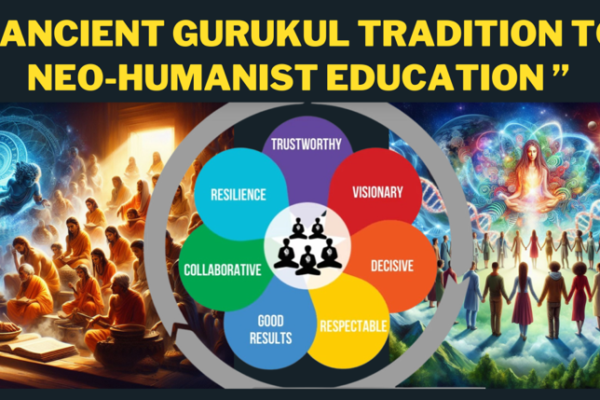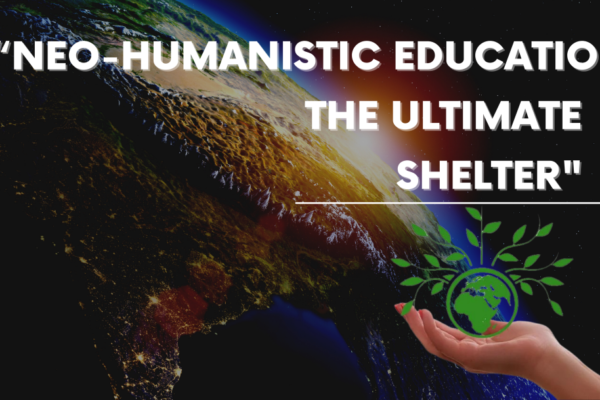(Presidential Address by Shri Prabhat Ranjan Sarkar, to the History Section
of the Progressive Writers’ Conference Held at Jamalpur on 1 January 1960)
There are numerous divergent views regarding the exact interpretation of the term “nation”. Some are of the opinion that the inhabitants of a particular state form a nation. Even if the terms “state” and “country” are taken to be synonymous, the controversy over “nation” does not end. Some people hold the view that the structure of a nation depends on language. Others are of the opinion that the foundation of a nation depends on one or more than one factor from among the following: similar manners and customs, similar mode of living, similar traditions, racial similarity, religious similarity, etc. But practical experience does not indicate that these factors are especially important.
How Is a Nation Formed?
Indians, Pakistanis and Burmese were once the indigenous population of the same political unit, the country of India, but they failed to constitute a nation.
If language were the only basis of forming a nation, Switzerland would have split up into three or four parts.
People did not demand an independent Bengalistan on the basis of the Bengali language.
The manners and customs in almost all the countries of Western Europe are practically the same; still they are not one nation. The mode of living all over Europe is almost the same, and we find the same thing throughout South Asia (including India and Pakistan), but no one could form a compact nation on the basis of that factor.
The inhabitants of Bengal have an identical tradition; so do the people of the Punjab. There is no difference of tradition between the Jews and the Muslims of Arabia. Still, neither the Bengalees, nor the Punjabis, nor the Jews and the Muslims of Arabia together, could form a nation. Rather, much blood has been shed among them on the basis of religion.
There are no racial differences among the inhabitants of Iberia, nor among the Scandinavians, yet they are divided into different nations. The tie of blood could not unite them. Therefore, efforts to establish a nation on the basis of race or blood relations will not always be effective.
If religion had been the only basis for forming a nation, there could not have been more than six or seven nations in the world. Most of Europe, on the whole, would have been divided into two nations: Catholics and Protestants. But this has not happened.
How, then, is a nation formed? In reality, a kind of sentiment created either directly or indirectly on the basis of one or more factors such as country, language, religion, etc., plays a vital role in forming a nation. The factors themselves are quite insignificant. It is the sentiment and nothing else that creates a nation.
The Aryan and Non-Aryan Nations
In olden times, when the Aryans came to India, there was no compact social order in the land of India. They brought with them the Vedic lifestyle and language; and the Vedic administration, social order and methods of warfare. They began to use the derogatory word Anárya [non-Aryan] for all the indigenous people of India. Slowly India was divided into two clearly different mental structures. One was the sentiment born of the vanity of the victorious Aryans, and the other was the sentiment created by the inferiority complex of the vanquished non-Aryans. Thus, two nations were formed in India: the Aryans and the non-Aryans.
Years rolled on. As a result of contact with the non-Aryans, the Vedic language of the Aryans underwent a change. Different regional languages came into existence. Racial blending between the Aryans and the non-Aryans took place and as a result of this social blending both the Aryan sentiment and the non-Aryan sentiment lost their respective specialities. These two nations died out with the weakening of the two sentiments which had caused the formation of the Aryan and the non-Aryan nations. In other words, India became nationless.
The Buddhist and Brahmanical Nations
In this nationless age, or age of chaos, the Buddhist upheaval in India occurred. Again a section of people became united with a common sentiment, the Buddhist sentiment. They formed a new nation. In the beginning the non-Buddhists were disunited, and hence they could not form a nation. But when the Buddhists, puffed up with pelf and power, began to be unfair to the non-Buddhists with the help of the ruling authorities, an anti-Buddhist sentiment grew up among the non-Buddhists, just as an anti-Aryan sentiment had previously grown up among the non-Aryans as a reaction to the oppression by the Aryans. Towards the end of the Buddhist period, two nations, roughly speaking, were to be found in India one based on Buddhist sentiment, and the other on anti-Buddhist sentiment.
The death of the Buddhist nation was caused on the one hand by the downfall of the bhikśus [Buddhist monks], the disorderly state of affairs in organizations and monasteries, the lack of support from the government, and above all, the want of renowned scholars among the Buddhists; and on the one hand by the support of the ruling authorities for the non-Buddhists, and the appearance of the great scholar and logician Shankaracharya. These factors brought about not only the defeat of the Buddhists, but also dissension within the Buddhist community. The new sentiment, known as the Sanátanii or Bráhmańya [Brahmanical] religion, which came into existence with the cooperation of Shankaracharya and the patronage of various non-Buddhist kings, was based on anti-Buddhist feelings. This is why, after the death of the Buddhist nation, the Brahmanical nation could not last long. Again India became nationless.
The Muslim and Hindu Nations
In the Post-Vedic Age, when both the Aryan and the non-Aryan nations died, no foreign invasion took place. Within the country, the Buddhist revolution occurred. When India became nationless for the second time after the demise of the Buddhist and the Brahmanical nations, there was no internal revolution. Instead there was the Muslim invasion from outside.
After the Muslim occupation, a new Muslim nation came into being. The Muslims had their own language (formerly Turkish and later Persian), manners and customs, dress, racial peculiarity, mode of living and religion, and on the basis of these factors a sentiment developed. Their sentiment was the sentiment of the ruling people.
It is no use denying the fact that the victorious Muslim nation played the role of oppressor and did much injustice to the inhabitants of India, as was done by the Aryans to the non-Aryans, by the Brahmanical nation to the Buddhists, and by the Buddhists to the non-Buddhists. The oppression and injustice done by the Muslims made the non-Muslims unite anew an anti-Muslim sentiment grew among them. Thus two nations were formed; the victorious Muslim sentiment based on the Persian language created one nation, while the Hindu sentiment based on the Sanskrit language created another. These two nations existed for a long time side by side in India.
By means of social directives a strong anti-Muslim sentiment was formed among the Hindus, as a result of which a Hindu nation was formed.
Two nations living side by side cannot maintain their independent sentiment for long; the same thing applied in the case of the Hindu and Muslim nations. The previous relation of the victorious Muslims with the vanquished Hindus ceased to exist. The Hindus and the Muslims began to treat each other as brothers and sisters. The Muslim sentiment of the Muslims weakened beyond expectation. With the disappearance of both sentiments, both the Hindu and Muslim nations died. India became nationless for the third time. For want of a sentiment, India was split up.
The Indian Nation
When India had become nationless for the second time, the Muslims invaded the country. And when India had become nationless for the third time, the British incursion into India began. The British very easily conquered the nationless India.
The Muslims no doubt conquered India, but they looked upon it as their mother country. The British came to India not to settle but to earn money.
After conquering India they started their machinery of exploitation in full swing, and formed a strong government to facilitate exploitation. They formed an English-knowing society to run the government smoothly. The exploitative machinery of the British opened the eyes of all classes of Indian people. The whole of India was united on the basis of an anti-British exploitation sentiment. This was the first time that all India had formed a nation. The English language served as the unifying link in India. English was no longer the language of the British only it had become the lingua franca of multilingual India.
An Indian nation developed as a result of the British, though they did not intend it. India, which had been split up into hundreds of parts, became united in the form of a country or a nation, which had never occurred in the past. Neither the Pandavas, nor Ashoka, nor Kanishka, nor Samudragupta could form one government throughout India. But the British did.
India’s Fight for Independence
In this fight for independence, the Indian leaders committed a blunder. They should have engaged themselves in an economic fight instead of starting a political movement. All Indians could have fought together unitedly, there being no Hindu, Muslim, Punjabi or Marathi feelings in this economic struggle, and as a result an anti-exploitation sentiment could have been developed in India. This sentiment could have made Indians stronger. The fight for economic independence would have brought political independence also. There might have been some delay in it, but political independence would have surely come.
The British took advantage of this blunder of the Indian leaders. They got the opportunity to divide India into two parts. They infused in the Muslims the idea that the Hindus formed the majority, and that therefore if the British quit India the government would naturally go into the hands of the Hindus, and the Muslims of the whole of India would remain as their subjects. Had the leaders started a movement for economic independence instead of accepting the partition of India, it would have been possible to form a united and independent India.
Reasons why they did not want economic independence:
Leaders in the struggle for political independence might not prove to be suitable leaders in the struggle for economic independence. Especially, the struggle for economic independence might lead to mass revolution and bloodshed at any time. And there was every possibility of young leaders appearing among the revolutionaries. The leaders did not want this. They tried to check the sanguinary revolution by preaching the theory of non-violence.
Most of the leaders, both Hindu and Muslim, had grown old in the course of the political struggle. Possibly they thought that if they started a fresh fight for economic independence, and if the fight lasted a long time, the chance of controlling the government would not come to them.
In the struggle for independence, the English language and the anti-British sentiment had made India one nation. With the departure of the British there is no anti-British sentiment, and so the Indian nation has died.
With the departure of the British from India – that is, with the death of the anti-British sentiment – a new sentiment should have been created, but the Indian leaders failed to do so.
The Immediate Course of Action
What is to be done now? The leaders should totally forget the question of organizing states on the basis of language and instead take up the task of reorganizing the states entirely on the basis of economics. In all spheres of life, along with English, maximum facilities are to be also afforded to each and every language of India, in their respective regions as the official language, and as the medium of public contact. There should not be any tendency to suppress anybody. If equal facilities are afforded to all in the matter of language, nobody will think of forming states on a linguistic basis.
First let the leaders form a strong nation on the basis of a strong sentiment. The Indian nation of the future will take the responsibility for arriving at a decision on national language. It is not the proper occasion to waste time and energy on this sort of issue, creating regional controversies.
India, the land of many nations, is just like a joint family full of internal dissension. Although it is not possible for these nations to form one nation through their joint efforts, they can live together amicably as a joint family by forming a group of nations (a compact multinational unit) based on one ideology.
What More Should Be Done?
Most of the people of India are poverty-stricken. They want to get rid of exploitation. Political independence has no value for them if it cannot give them economic independence. If a strong nation or group of nations is to be built, a fight against exploitation will have to be launched. Unless a strong sentiment is created, a nation or a group of nations cannot be formed. The government hardly gets any support or cooperation from the people in its welfare work for want of a sentiment among the people.
If an anti-exploitation sentiment is created among the poverty-stricken mass of India, not only will a strong nation or a strong group of nations be formed, but this nation or group of nations will continue with due solidarity for a long time.
Perhaps the leaders will try to unite the people forcibly through the pressure of governmental machinery. But will this be possible? The different characteristics of the peculiar land of India cannot be pounded into dust by the steamroller of governmental machinery, and such unity is not at all desirable. The more the steamroller is used, the greater the dissatisfaction among the people will be.
Bhúdán and Sarvodaya movements very carefully avoid an anti-exploitation campaign. They will only be advantageous to the capitalists because the fighting spirit of the people is tactfully suppressed.
To save India the present leaders should immediately chalk out a policy to convert the people of India into a strong nation or a strong group of nations. We should not forget that in the past it was the want of unity which brought India under the yoke of slavery time and again. If there is lack of unity at present, it should be understood that India has become intellectually bankrupt.
The Primary Duty Today
Unite India through an anti-exploitation campaign. This anti-exploitation campaign will not only unite India, but also India with Pakistan and with each of the poor and backward countries of Southeast Asia. A strong nation or group of nations will thereby grow up. It matters little what name is given to that nation or that group of nations.
Although the anti-exploitation sentiment is the most important factor in building a nation or a group of nations, this sentiment will not be able to sustain a nation or a group of nations for a long time. One day exploitation must cease. If it is not stopped completely, it can be confidently said that in the future the intensity of exploitation will be much less than what it is today. As soon as administrative power passes into the hands of moralists, then exploitation will cease to exist. In the absence of exploitation the anti-exploitation sentiment will die out, and consequently a nation or a group of nations based on the anti-exploitation sentiment will not exist either.
What will happen then? The sentiment of spiritual inheritance and Cosmic ideology will keep people united. It is true that this spiritual sentiment will not help to form a nation inside any particular country, but it will definitely unite the entire planetary world, and even the universe, into a nation. Then there will be only one universal nation.
Today human beings, to whatever country they may belong, should, on the one side, propagate an anti-exploitation sentiment (exploitation does not mean exploitation in the economic sphere only, it includes all sorts of exploitation), and form strong nations in their respective countries; and, on the other side, preach the theory of one spiritual inheritance that every living being is the child of the Supreme Entity, and that all the people of all nations belong to the same family.
Along with the theory of spiritual inheritance, one Cosmic ideology will have to be propagated too, and that ideology is that one Supreme Entity the Cosmic Entity is the goal of all living beings. This spiritual sentiment will keep human beings united for all time to come. No other theory can save the human race.






